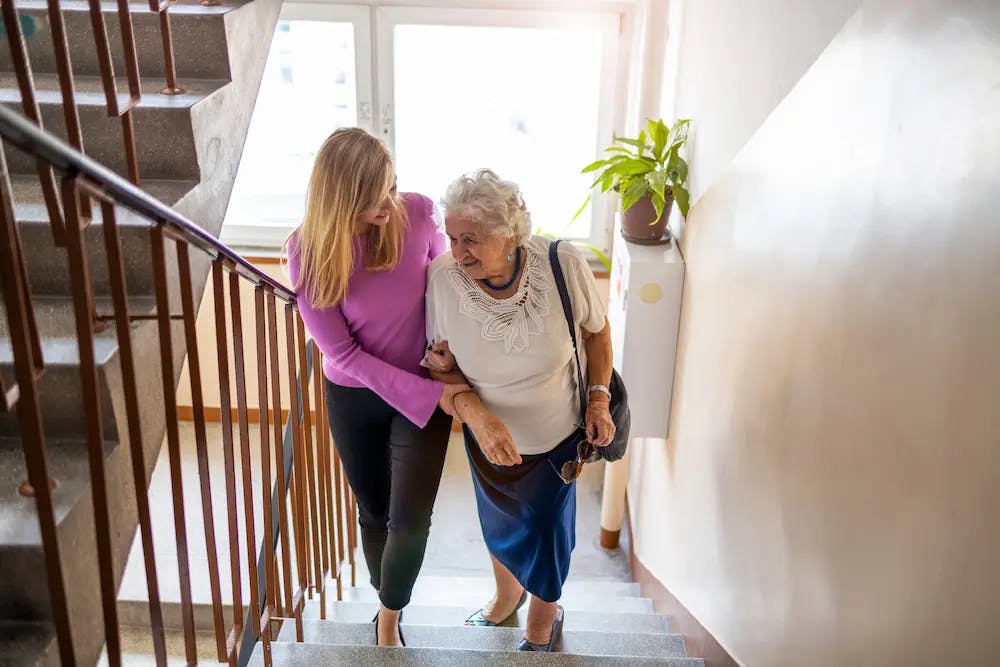Dementia Care At Home Explained & How To Find It

Estimated Reading Time: 7 minutes
This article was reviewed by Hannah Karim, Customer Care Lead at Lottie, on 18th December 2024. Hannah Karim has over three years of experience within the care sector and works closely with families to ensure they find the right care option. Hannah has received training from organisations such as Mind and The National Bereavement Service, and is also a certified Dementia Friend. Next review due December 2025.
Looking after somebody with dementia can be challenging. If your loved one’s care needs have progressed beyond the level of support you or other family members can provide, arranging dementia care at home from trained care professionals may be the best option.
This article explains what dementia care at home is, the types of support available from home care operators across the UK, whether your loved one requires dementia care at home, the cost, the benefits and how to find it.
Arrange dementia care at home
Browse dementia home care in your area.
In this article:
- What is dementia care at home?
- When does your loved one need dementia care at home?
- How much does dementia care at home cost?
- Benefits
- Find dementia home care near you
What Is Dementia Care at Home?
Dementia is a general term for progressive neurodegenerative diseases where your brain declines over time, including people becoming more forgetful and finding it more challenging to think clearly and make decisions. Dementia can also make daily tasks more difficult and lead to a loss of mobility.
There are lots of different types of dementia. These vary depending on which part of the brain is affected and the subsequent skills that are impacted.
Dementia care at home is for people living with a form of dementia such as Alzheimer’s disease or vascular dementia and is given by a trained dementia carer.
Through dementia care at home, trained staff use specialist techniques and provide dignified, person-centred care to ensure your loved one can continue living a fulfilling life. This care is given to your loved one in the comfort of their own home, allowing them to maintain a routine within a familiar environment.
A common example of dementia treatment is reminiscence therapy. This is where people’s senses are stimulated to evoke memories of events, people and places from years gone by.

Types of support available through dementia home care
We’re partnered with the UK’s best home care providers. The main types of dementia home care available are:
People living with dementia often require personal care. Our providers offer:
- Bathroom assistance
- Continence care
- Support with drinking and eating
- Oral medication support
- Washing and dressing
Many people living with dementia need help with household tasks as well. Our providers offer assistance with:
- Administrative tasks
- Gardening
- General housekeeping
- Laundry
- Meal preparation
- Pet support
- Shopping and running other errands
- Transportation
When Does Your Loved One Need Dementia Care at Home?
If you think your loved one may need dementia care at home, you should look out for the following signs and ask the following questions:
- Are they wandering?
- Are they becoming more forgetful?
- Are they finding it more challenging to complete daily living tasks such as food preparation and cooking, cleaning and taking medication?
- Have their care needs generally increased?
If the answer to the above questions is yes, your loved one may require some form of dementia care, such as dementia care at home. Whether your loved one needs extra support will likely come down to whether they’re able to continue safely without it or not.
Care needs assessment for dementia
If you and your loved one are unsure what kind of care they require, you can get a care needs assessment by social services. A care needs assessment will determine what type of care your loved one needs and whether they require home adaptations (so somebody can continue safely living within their own home).

How Much Does Dementia Care at Home Cost?
Dementia care at home can be provided through several forms of home care. We’re partnered with the country’s best home care providers, and the average cost of the different forms of home care are:
Domiciliary (hourly) care - This costs an average of £27 per hour. So, if your loved one were to receive 10 hours of domiciliary care a week, this would cost around £270 per week, £1,170 per month and £14,040 per year
Live-in care - This costs an average of £206 per day. So, full-time live-in care would cost around £1,442 per week, £6,249 per month and £74,984 per year
Overnight sleeping care - This costs an average of £178 per night. So, permanent overnight sleeping care would cost around £1,246 per week, £5,399 per month and £64,792 per year
Overnight waking care - This costs an average of £230 per night. So, permanent overnight waking care would cost around £1,610 per week, £6,977 per month and £83,720 per year
The Benefits of Dementia Care At Home
A familiar and comfortable environment - Staying in a familiar environment (your loved one’s own home) will reduce confusion and anxiety. This familiarity will also make it easier to maintain a routine
Tailored care - Dementia care at home can be tailored, so your loved one’s needs will be looked after on an individual basis
Family involvement - Dementia care at home makes it easier for family members and close friends to be involved in the caregiving process

Flexibility - You can choose the hours and the exact care given. We’re partnered with domiciliary care providers who offer a range of time slots and services. This flexibility is also more cost-effective, as you’ll only pay for the amount of care required
Peace of mind - You and other family members or close friends can feel comfortable in the knowledge that your loved one is receiving the care and support they need
Find Dementia Home Care Near You
We’re here to help you find the best dementia home care near you. If you need extra support, our care experts provide free advice and assistance to help you and your loved one make the right choice. Get in touch today.
We’re partnered with home carers throughout the UK, many of which offer a range of specialist dementia care services, including early-stage dementia, late-stage dementia and Alzheimer’s care.
National home care agencies that offer dementia care
The following are nationwide home care agencies that provide dementia care at home across the UK:
- Dove Home Care
- Edyn Care
- Ellea Nursing
- Hamilton George Care - England
- Helping Hands Live-In Care
- Noble Live-In Care
- Promedica24
- The Good Care Group - England
- The Good Care Group - Scotland
- Trinity Homecare
Learn About Other Types of Home Care
We’re here to help you and your loved ones choose the right type of home care. Click the links below to learn more about the different types of home care offered by the care agencies we work with:
Loading FAQs...



